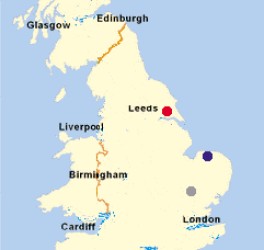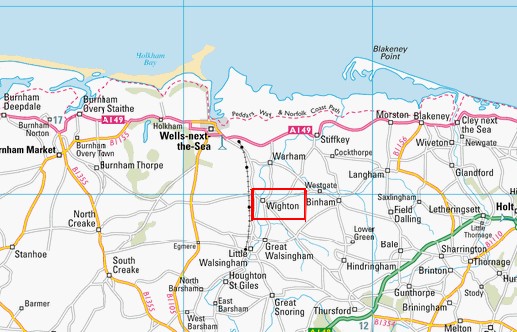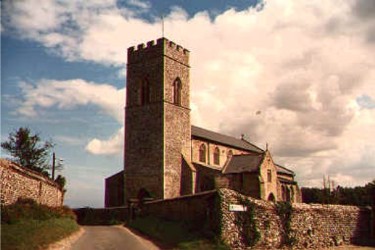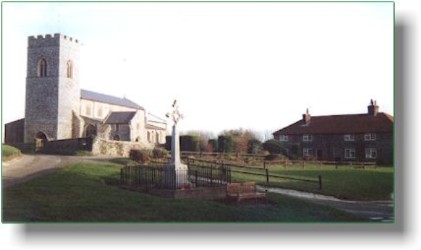

Above left, the blue dot in the map of England approximates the location of Wighton, Norfolk. Above right, a closer view. The village of Wighton, North Norfolk, lies about 3.5 miles south of Well-next-the Sea. In 2001, the village had a population of 203 and 92 households.
We've learned that the Scottish surnames that turned up in Scotland between 1500 and 1850 had a strong phonological link to the Anglo-Saxon name for Wighton, Norfolk (Wictun). We've also learned that there's a strong link between virtually all of the variant names that appeared in those Scottish records. But, what about the names that appeared in the Norfolk, England records? Did they have a link back to Wictun? Did they have a link to our current surname?
I had the opportunity to do some genealogy browsing through the Norfolk Library in Norwich during my honeymoon in 2000. (There's no limit to what a dedicated family researcher will do to find information on his ancestors. The things I do for this family, I tell you.) I found a number of print resources which recorded the presence of 16 variants of the English village's name.
The earliest reference was in 1086 when the village name (Wistune) was mentioned in the Doomsday Book. The church was known as Wichetune during the period 1133-1189. The Wighton spelling of the town appeared in records as far back as 1216 while the Wyghton spelling appeared in 1251. The earliest person mentioned was Alan de Wihton in 1195.
Many of the people mentioned were from the 13th centuries when the surnames took this form: Alan de Wihton (1195), Walter de Wycton (1239), Alan de Wythton (1246), Peter de Wihtton (1248), Eustace de Wyhton(1250), Eustace de Wichton (1250), Hugh de Wyghton (1251), and Hubert de Wyhcton (1278). The first villager to appear with a modern form of surname (i.e., without the preposition) was (fittingly) John Wyghton in 1383. (For more information on the origin of surnames, click Why surnames originated in Norman England.)
In all, there were 16 versions of our name in Norfolk records. Now, let's take a look at those surname variants and see if they're consistent with a Weechtoon pronunciation.

